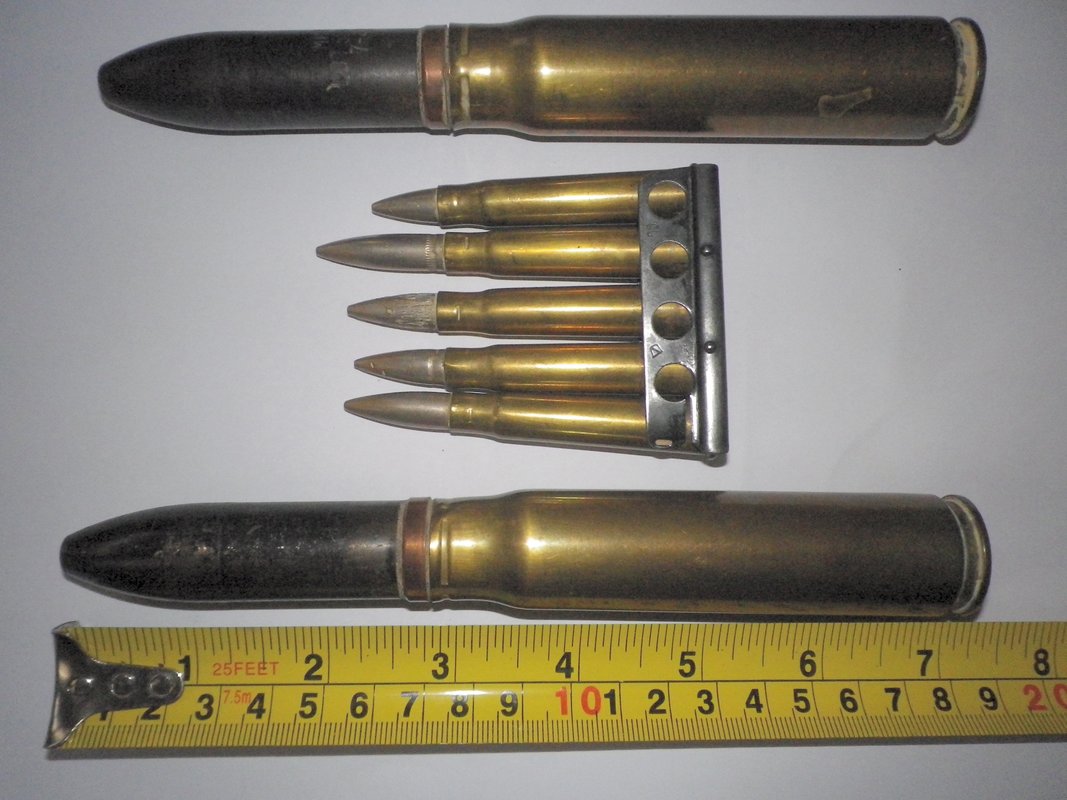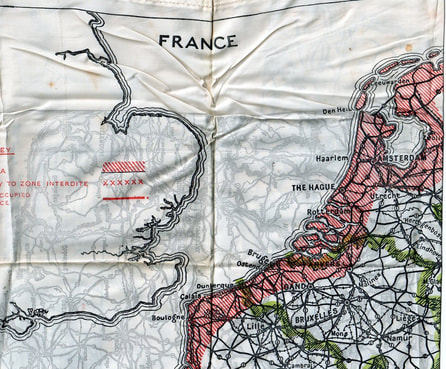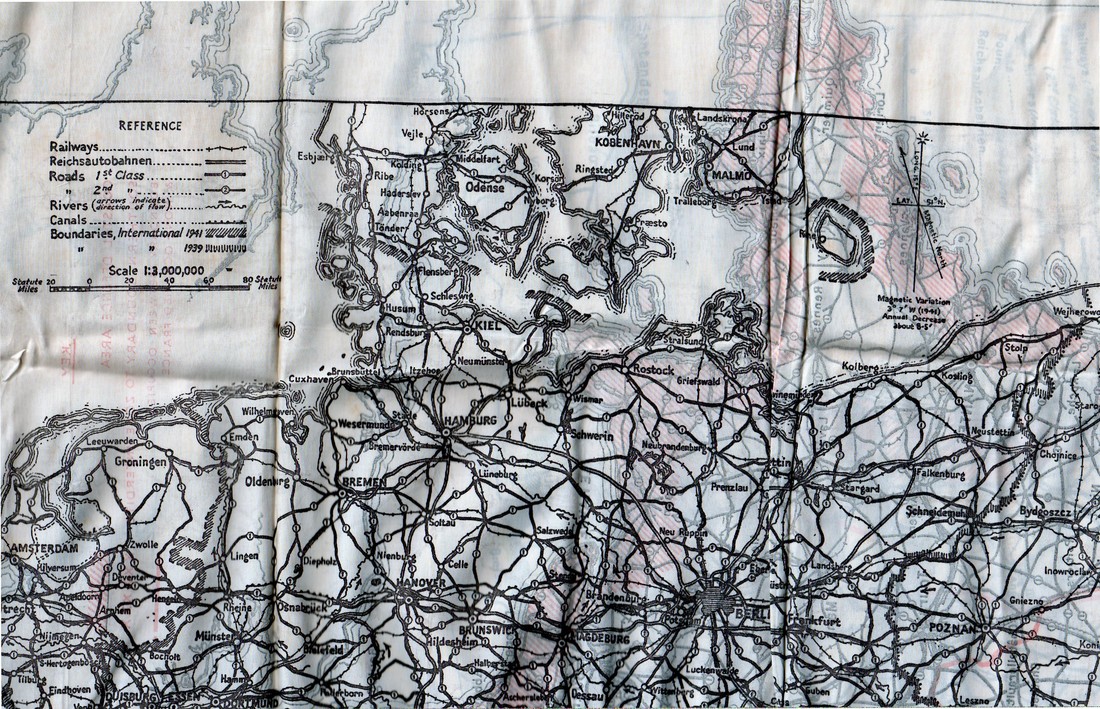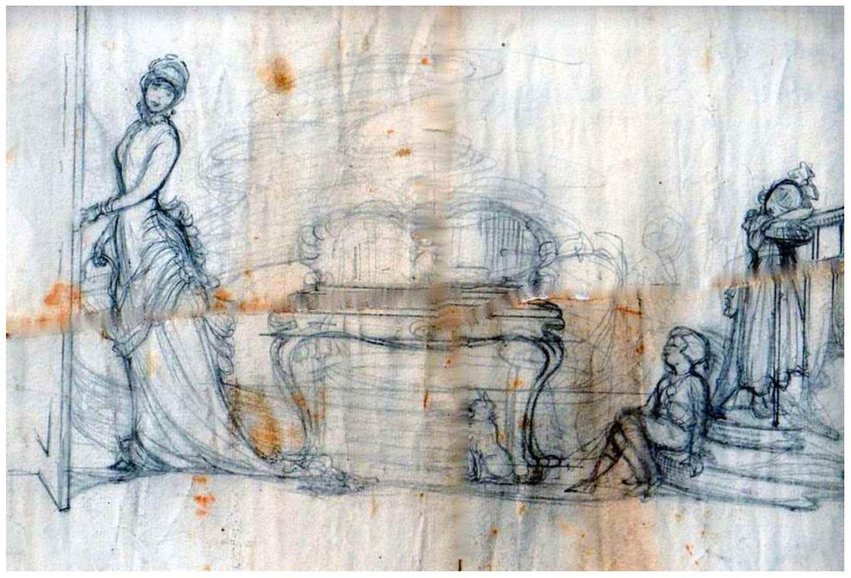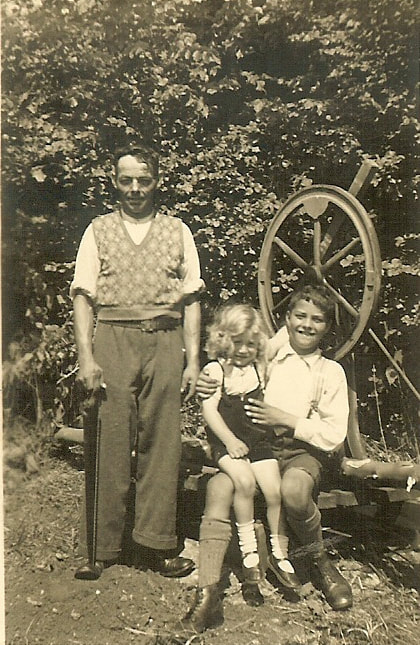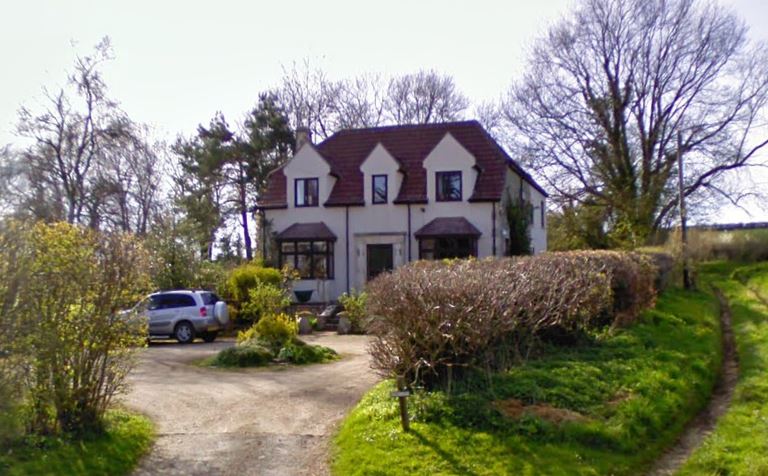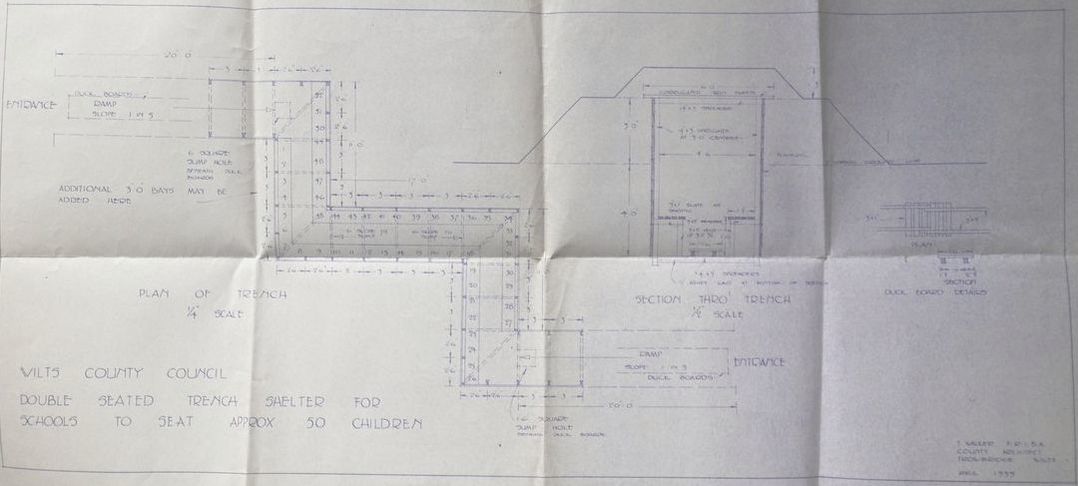|
My Life as a Wartime Child
Les Dancey February 2017 I have a number of wartime shells which I believe were the ammunition for the Spitfires in addition to a clip of 303 rifle rounds. As children we would collect them as souvenirs of the war, regardless of whether they were live ammunition or not. These ones were live when we first had them and they used to sit in the grate by the open fire. We later removed the explosive charge from them. Right: Wartime shells (courtesy Les Dancey) |
I also have a silk map that they used to issue the pilots in case they got shot down over enemy territory. It has France on one side and Germany on the other in the belief that they pilots would survive the crash and be able to make their way back to Britain.
Wartime Toys
As kids growing up in wartime we couldn't pop down the toy shop so we had to make our own.[1] We would make tractors with cotton reels, rubber bands, candles and matchsticks. The cotton reels would be the body and have grooves cut all the way round both sides to provide grip on the surface. A slice of candle would have a hot needle or nail poked through where the wick was. Half a matchstick was used to lock the rubber band when passed through the cotton reel, candle and over the end of a whole matchstick making a groove for it to grip the candle and this would propel the tractor when the rubber band had been wound up.
Another thing we used to make is a pistol which was just two pieces of wood, one for the handle and one for the barrel. The latter would have a nail knocked partially in to act as a trigger. The two pieces of wood would be just held together with a stout rubber band or tyre section and a smaller rubber band would be stretched from the front of the barrel and pinched between the two pieces of wood so that when the trigger was pulled it released the small rubber band as a missile.Of course we made pea-shooters, catapults, along with bows and arrows also spears which we launched in sling fashion.
My Christmas stocking then contained an orange and something my mother or father had made out of what was available, together with a hand-me-down item of clothing. I didn't see too much my dad because he went to work at the
MOW (the Ministry of Works which requisitioned property for war usage), leaving home at 0500hrs and back in the evening for tea and then out again to the Home Guard.
As kids growing up in wartime we couldn't pop down the toy shop so we had to make our own.[1] We would make tractors with cotton reels, rubber bands, candles and matchsticks. The cotton reels would be the body and have grooves cut all the way round both sides to provide grip on the surface. A slice of candle would have a hot needle or nail poked through where the wick was. Half a matchstick was used to lock the rubber band when passed through the cotton reel, candle and over the end of a whole matchstick making a groove for it to grip the candle and this would propel the tractor when the rubber band had been wound up.
Another thing we used to make is a pistol which was just two pieces of wood, one for the handle and one for the barrel. The latter would have a nail knocked partially in to act as a trigger. The two pieces of wood would be just held together with a stout rubber band or tyre section and a smaller rubber band would be stretched from the front of the barrel and pinched between the two pieces of wood so that when the trigger was pulled it released the small rubber band as a missile.Of course we made pea-shooters, catapults, along with bows and arrows also spears which we launched in sling fashion.
My Christmas stocking then contained an orange and something my mother or father had made out of what was available, together with a hand-me-down item of clothing. I didn't see too much my dad because he went to work at the
MOW (the Ministry of Works which requisitioned property for war usage), leaving home at 0500hrs and back in the evening for tea and then out again to the Home Guard.
Air Planes Overhead Powlilea
I remember airplanes fighting overhead whilst I was visiting Powlilea, Tutton Hill, Box with my mother. The house burned down some time after the war. I was upset about this as it was a property that I would have loved to own myself. Mrs Foster and her daughter Nell lived at Powlilea during the war and well into the 1940s. When I was pre-school age and I would use the metal scraper outside the kitchen door as a horse. I could hardly straddle it at first. I believe that Nell was an illustrator for a fashion magazine or similar. I have a drawing that she had torn up and assigned to the waste bin. I have joined it back together and it looks as though it was an illustration for a book rather than a fashion magazine. Haven't looked at it for years and just remembered that it was a fine illustration of a glamorous woman.
I remember airplanes fighting overhead whilst I was visiting Powlilea, Tutton Hill, Box with my mother. The house burned down some time after the war. I was upset about this as it was a property that I would have loved to own myself. Mrs Foster and her daughter Nell lived at Powlilea during the war and well into the 1940s. When I was pre-school age and I would use the metal scraper outside the kitchen door as a horse. I could hardly straddle it at first. I believe that Nell was an illustrator for a fashion magazine or similar. I have a drawing that she had torn up and assigned to the waste bin. I have joined it back together and it looks as though it was an illustration for a book rather than a fashion magazine. Haven't looked at it for years and just remembered that it was a fine illustration of a glamorous woman.
Below left are my brothers sat with our father in the grounds of the house before the war, where there was a well. Below right is the present building on the site.
Problems at School
Threat of a direct air attack on Box School was a constant fear which had no easy solution other than to keep children away. Plans for trench shelters were clearly inadequate both in providing security and large enough for all the children. The local newspaper reported in 1942:
Wartime life at Box School was a roller-coaster with too many children, then too few, and the need for constant alteration to the numbers of teaching staff. The school opening times had been cut to 5½ hours per day with morning attendance only. But the increased risk of daylight bombing raids made school buildings a more vulnerable target and many parents simply kept their children away whenever the prospect of an air raid attack was likely. It was the obvious thing to do when the main protection for the children was to hide them under their school desks. A meeting in Bath in October 1942 highlighted the issue with headlines Desks No Good, Flying Glass Danger and fear that children assembling to go into shelters would make them vulnerable to machine-gunning.[2]
Threat of a direct air attack on Box School was a constant fear which had no easy solution other than to keep children away. Plans for trench shelters were clearly inadequate both in providing security and large enough for all the children. The local newspaper reported in 1942:
Wartime life at Box School was a roller-coaster with too many children, then too few, and the need for constant alteration to the numbers of teaching staff. The school opening times had been cut to 5½ hours per day with morning attendance only. But the increased risk of daylight bombing raids made school buildings a more vulnerable target and many parents simply kept their children away whenever the prospect of an air raid attack was likely. It was the obvious thing to do when the main protection for the children was to hide them under their school desks. A meeting in Bath in October 1942 highlighted the issue with headlines Desks No Good, Flying Glass Danger and fear that children assembling to go into shelters would make them vulnerable to machine-gunning.[2]
Mostly it was changes and shortages of staff that caused the most disruption to the children's education. In April 1944
Miss CM Smith was transferred to Malmesbury because of the shortage of teachers there.[3] She had come from London with the evacuee children in 1939 and settled into the village. She was sorely missed.
Miss CM Smith was transferred to Malmesbury because of the shortage of teachers there.[3] She had come from London with the evacuee children in 1939 and settled into the village. She was sorely missed.
Militarisation of Young People
Whilst Les was too young to be actively involved in the war, the Scout movement was used to support the military initiative.[4] This included the formation of a Box Rover Group in January 1939, who assisted with manning road blocks and keeping watch overnight at Kingsmoor House in the early years of the war in order to raise the alarm should German parachutes be seen.[5]
They were also active in fund raising for the Spitfire Fund, the Mayor of Bristol's Air Raid Relief Fund and collecting paper for
re-cycling in the war effort.
By the spring of 1941 the numbers of Box Rovers had diminished as young men were conscripted into full military service and the troop was officially disbanded in March 1942.[6] By 1943 the lack of manpower to assist with supervision meant that the cubs, guides and scouts also came to an end. The Scout Hut on the Devizes Road was taken over by the Home Guard and later by the Village Emergency Committee, responsible for taking over local matters if the village was invaded.[7]
Whilst Les was too young to be actively involved in the war, the Scout movement was used to support the military initiative.[4] This included the formation of a Box Rover Group in January 1939, who assisted with manning road blocks and keeping watch overnight at Kingsmoor House in the early years of the war in order to raise the alarm should German parachutes be seen.[5]
They were also active in fund raising for the Spitfire Fund, the Mayor of Bristol's Air Raid Relief Fund and collecting paper for
re-cycling in the war effort.
By the spring of 1941 the numbers of Box Rovers had diminished as young men were conscripted into full military service and the troop was officially disbanded in March 1942.[6] By 1943 the lack of manpower to assist with supervision meant that the cubs, guides and scouts also came to an end. The Scout Hut on the Devizes Road was taken over by the Home Guard and later by the Village Emergency Committee, responsible for taking over local matters if the village was invaded.[7]
Glimpses of Childhood
A great problems was how to give children a decent life with all the wartime restrictions. Joan Warwick single-handedly ran a children's dance school in Box, part of the Lita-Jane School of Dancing.[8] In 1943 A Holidays at Home scheme was started by Stothert and Pitt at the ground of Bath City Football Club, the first such fete since war was declared.[9] It was a family event with horticultural displays of allotment produce, a baby show and children's fancy dress and races. In Box, the scheme was operated by the Girl Guides under their leader Mrs John King.[10] To fundraise Miss Joan Baxter sold a pot of home-made jam for 16s and Miss Glenice Hulbert made £1.1s in an egg competition.
The children's education had suffered considerably in the wartime restrictions, lack of opportunities and constant staff changes. The parish magazine of June 1945 wrote: We cannot speak too highly of the way Mr Swan has carried out the duties of acting headmaster during the interregnum. He has worked cheerfully and efficiently and got on well with both staff and children.
On 16 June 1945 a new head took up his post, Mr Adams.
A great problems was how to give children a decent life with all the wartime restrictions. Joan Warwick single-handedly ran a children's dance school in Box, part of the Lita-Jane School of Dancing.[8] In 1943 A Holidays at Home scheme was started by Stothert and Pitt at the ground of Bath City Football Club, the first such fete since war was declared.[9] It was a family event with horticultural displays of allotment produce, a baby show and children's fancy dress and races. In Box, the scheme was operated by the Girl Guides under their leader Mrs John King.[10] To fundraise Miss Joan Baxter sold a pot of home-made jam for 16s and Miss Glenice Hulbert made £1.1s in an egg competition.
The children's education had suffered considerably in the wartime restrictions, lack of opportunities and constant staff changes. The parish magazine of June 1945 wrote: We cannot speak too highly of the way Mr Swan has carried out the duties of acting headmaster during the interregnum. He has worked cheerfully and efficiently and got on well with both staff and children.
On 16 June 1945 a new head took up his post, Mr Adams.
Les Dancey Recalls After the War
At the end of the war the family were invited to visit the ship that my brother Dennis Dancey had served on and to meet the crew. Whilst the grown ups were chatting away in the bridge I went exploring. Climbing down the ladder at the rear of the ship, where the equipment and men disembarked out of the rear doors, there must have been another vessel passing because the boat moved and water spilled in on the decking. I thought it was sinking so I dashed up the ladder as fast as I could and back to the bridge where they were splicing the main brace. I was offered and accepted a little tot of rum to help me recover.
Les was five years old when the war ended; he had only known wartime conditions throughout his life. He accepted them and even regards them with affection. But the war adversely affected all children's upbringing and schooling.
At the end of the war the family were invited to visit the ship that my brother Dennis Dancey had served on and to meet the crew. Whilst the grown ups were chatting away in the bridge I went exploring. Climbing down the ladder at the rear of the ship, where the equipment and men disembarked out of the rear doors, there must have been another vessel passing because the boat moved and water spilled in on the decking. I thought it was sinking so I dashed up the ladder as fast as I could and back to the bridge where they were splicing the main brace. I was offered and accepted a little tot of rum to help me recover.
Les was five years old when the war ended; he had only known wartime conditions throughout his life. He accepted them and even regards them with affection. But the war adversely affected all children's upbringing and schooling.
References
[1] Extracts from Les Dancey's full article
[2] Bath Weekly Chronicle and Herald, 3 October 1942
[3] The Wiltshire Times, 1 April 1944
[4] David Ibberson, The Box Collection Vol 2, 1989, p.35
[5] David Ibberson, Lamberts Way: Scouting in Box, 1985, p.23
[6] David Ibberson, Lamberts Way: Scouting in Box, p.29
[7] David Ibberson, Lamberts Way: Scouting in Box, p.29
[8] Bath Weekly Chronicle and Herald, 17 July 1943
[9] Bath Weekly Chronicle and Herald, 14 August 1943
[10] Bath Weekly Chronicle and Herald, 28 August 1943
[1] Extracts from Les Dancey's full article
[2] Bath Weekly Chronicle and Herald, 3 October 1942
[3] The Wiltshire Times, 1 April 1944
[4] David Ibberson, The Box Collection Vol 2, 1989, p.35
[5] David Ibberson, Lamberts Way: Scouting in Box, 1985, p.23
[6] David Ibberson, Lamberts Way: Scouting in Box, p.29
[7] David Ibberson, Lamberts Way: Scouting in Box, p.29
[8] Bath Weekly Chronicle and Herald, 17 July 1943
[9] Bath Weekly Chronicle and Herald, 14 August 1943
[10] Bath Weekly Chronicle and Herald, 28 August 1943
